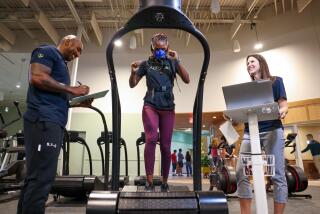‘Livelyhood’ Strives to Give Upbeat Look at Workplace
- Share via
American television in the ‘90s has become relentlessly populist, from “The Jerry Springer Show” to “America’s Funniest Home Videos.” While suspension of disbelief is still the founding principle of mass entertainment, network executives have discovered that TV viewers are endlessly fascinated by shows that approximate real life.
Yet, despite this epiphany, the small screen offers precious little programming on one of the most populist activities of all--work.
Into this considerable breach has stepped “Livelyhood,” a PBS series that trains its cameras on American workers and the issues they are confronting as the century draws to a close.
“Livelyhood” is the brainchild of the Working Group, a Bay Area-based production company that has made its reputation by delving into areas typically ignored, or sensationalized, by TV journalism. Over the past decade, the nonprofit outfit has produced such programs as the award-winning documentary series “We Do the Work,” which ran for six years on PBS, and “Not in Our Town,” which examined how various communities around the country are organizing against the rising incidence of hate crimes.
The Working Group’s latest undertaking, which debuted last fall, is an ambitious attempt to explore the rapidly changing American workplace and its myriad effects on people’s lives. “Livelyhood’s” initial four shows cover everything from the dislocation caused by downsizing and new technology to the rising number of employee-owned partnerships to the evolving relationship between work and community.
While the program’s agenda is meaty, the tone is decidedly accessible. Hosted by political humorist Will Durst, “Livelyhood” strives to tackle its subject from a folksy, egalitarian perspective.
“A lot of people do TV shows about real people, and it’s kind of an upper-class expose--you know, letting the real people talk,” says Durst during an interview after a screening of the newest episode at KCET-TV Channel 28. “We are real people, so I think it was easier for us to see that they’re smart.”
For Patrice O’Neill, executive producer of “Livelyhood” and co-founder of the Working Group, conveying the show’s unwieldy substance in a cogent, entertaining way presented a difficult challenge.
“Work is sometimes a source of a lot of pain and stress, and people have different ideas about how you fix what’s wrong in the workplace,” O’Neill says. “You have corporate heads who think the most important thing is to make more money, and employees who think the most important thing is for them to have a better life. You have people who are obsessed by work, and people who only work because they want another life. . . . So how do you do a television show that really draws people from very different points of view into a discussion? I think Will is incredibly good at that.”
The latest installment of “Livelyhood,” titled “Working Family Values,” grapples with the ever-intensifying struggle to balance job and family. One of the show’s segments focuses on a Colorado man whose child-care business allows him to stay at home with his own kids. Another looks at First Tennessee Bank, which jettisoned its notoriously hard-line posture in favor of a family-friendly policy that gives employees flexibility in setting their hours.
The program also includes a profile on an immigrant couple in Los Angeles who have stretched their meager living to the limit in order to buy a house and send their two kids to private school. “I received more than my mother has and want to give to my kids more than we have,” says the compelling Rosa Rivera, who earns $8.12 an hour as a housekeeper at the Omni Hotel while husband Arturo makes $7 an hour at a sprinkler factory. Together, the pair clock more than 130 hours a week, including time spent at the Boyle Heights discount store they opened to supplement their income.
While the Rivera portrait, like all the show’s segments, is given an upbeat spin, one could easily interpret their story in a far less positive light. The Riveras are the exception--most working-class immigrant families in Los Angeles do not own a home or enroll their children at private school. In order to do so, the Riveras maintain a punishing schedule that inevitably takes its toll on family time.
Likewise, First Tennessee’s enlightened Family Matters policy is clearly not the norm in corporate America. Neither is the innovative Brooklyn HMO plan (also profiled in the show) that enables seniors to participate in a reciprocal volunteer program that gives them “time dollars” for helping other members.
O’Neill acknowledges that “Livelyhood’s” rose-colored-glasses approach may draw fire from some viewers. But she defends her decision to accentuate the positive.
“I’m not saying that there shouldn’t be programming that’s critical about problems in the workplace,” O’Neill says. “We desperately need it. It’s just that we’re trying to do one little thing with this show, and actually go pluck out those stories that say, ‘Hey, things could be different.’ ”
For both O’Neill and Durst, “Livelyhood” is ultimately meant as an inspirational tool in a period fraught with insecurity.
“I think this show proves that resiliency is a good thing,” Durst says, “that the pluck of the American spirit that we have so celebrated in our past is still with us.”
*
* “Livelyhood” airs tonight at 10 on KCET-TV Channel 28.
More to Read
The complete guide to home viewing
Get Screen Gab for everything about the TV shows and streaming movies everyone’s talking about.
You may occasionally receive promotional content from the Los Angeles Times.






